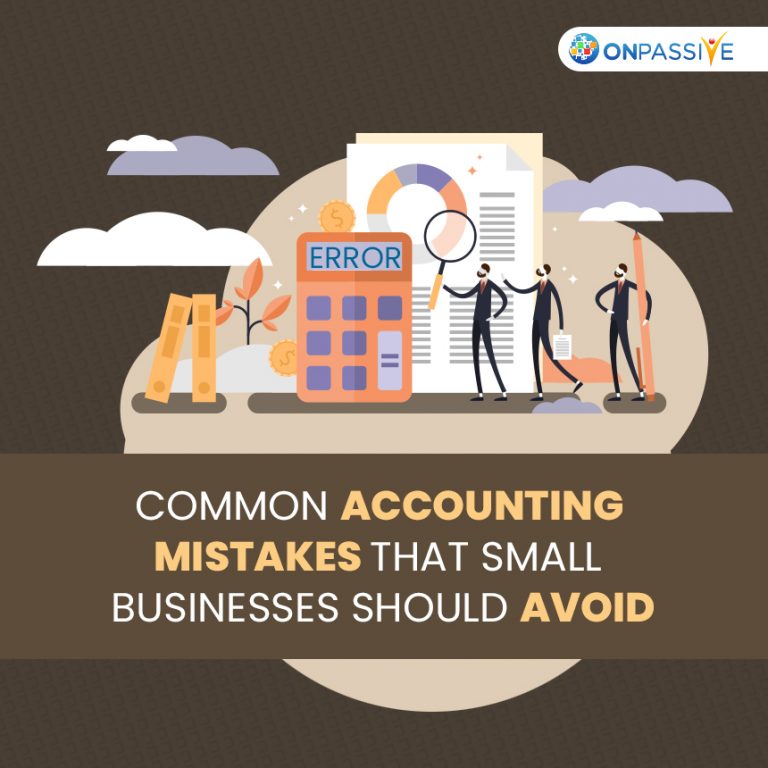
While Accounting software made accounting and book-keeping easier for small businesses, it also increased few accounting mistakes more common. These mistakes can include anything from incorrectly categorizing a transaction to doing all the accounting yourself in-house.
Although few accounting mistakes are minor and can easily be noticed and corrected, others can be more serious and can significantly affect the fiscal health of your business.
Over time, bad accounting practices and repeated accounting mistakes can impact the financial health of your business and lead to insolvency. Therefore, small businesses should consider following correct practices and choose the right people to handle their accounting needs.
Common Accounting mistakes that small Businesses should Avoid
Small businesses with minimal outsourcing and who are handling their own accounting needs should avoid the following mistakes:
- Working without creating a Budget
Businesses should always create a budget to have a baseline to judge the results of business operations. These budgets are helpful to curb over expenditure and help establish written financial objectives that are realistic to the company.
Businesses can use the budget to set financial goals reasonable to the company, including increasing the revenue or reducing operating costs.
- Failing to follow Accounting procedures
Self-employed individuals and small business owners should set formal, detailed and documented accounting procedures for bookkeeping and managing the accounting procedures. These procedures can help perform other routine tasks as well.
Following the accounting procedure is a helpful step in developing checklists so that tasks can be completed consistently and accurately. Developing a standardized form or a checklist for your small business accounting procedures and having a written policy helps employees get the information and effortlessly follow the procedures.
- Making Errors in Data Entry
One of the most common accounting mistakes is errors in data entry. Data entry errors occur in all businesses. Businesses can consider having policies to ensure that any errors during data entry can be detected quickly and corrected while performing various reconciliations in a timely manner.
To identify the possible errors in the classification of expenses or revenues, businesses can run budget-to-actual variances. They should also review unusual transactions to ensure there are no data entry mistakes and the transactions are accurate.
- Managing all the Accounting In house
Many small businesses with limited revenue tend to handle all the accounting on their own. Although handling all the accounting on your own can save a lot of money, it could cost your business money.
Managing all the accounts in-house from errors to tax deductions can result in misses in opportunities to save your money. Therefore, getting an accountant will help you save a lot of time and money while reducing errors.
- Failing to Backup Accounting Software
The back-up of accounting software and other essential data should be done by businesses regularly. Small businesses can take advantage of the feature that lets automatic backup of accounting programs with small accounting software.
Organizations should always double-check the backup files because sometimes the files may corrupt, and sometimes backup of all the required data may not be complete. So checking the backup files can help identify the problems of your backup process so that they can be rectified immediately.
- Failing to categorize expenses and income accurately
Business owners who are willing to stay on top of their accounting records should correctly assign all the money coming in and going out of your business into appropriate categories. They need to have information about who was billed, for how much amount, and if the customer has made the payment.
The tax returns should be prepared right before the return is due for a smoother year-end tax preparation rather than reassembling all the records.
Following a proactive approach towards accounting and being aware of common mistakes made by others, and trying to avoid them or correct them early will save time and money for your business while helping you gain a competitive advantage in the market with more streamlined operations.
Conclusion
As a small business progresses and becomes more established, the owners will become more aware of how much amount should be spent to continue business operations, enabling them to easily set budgets for the appropriate projects that eventually lead them to success. Being aware of the common accounting mistakes and avoiding them in business accounting practices helps small businesses serve customers better by gaining a competitive advantage.


